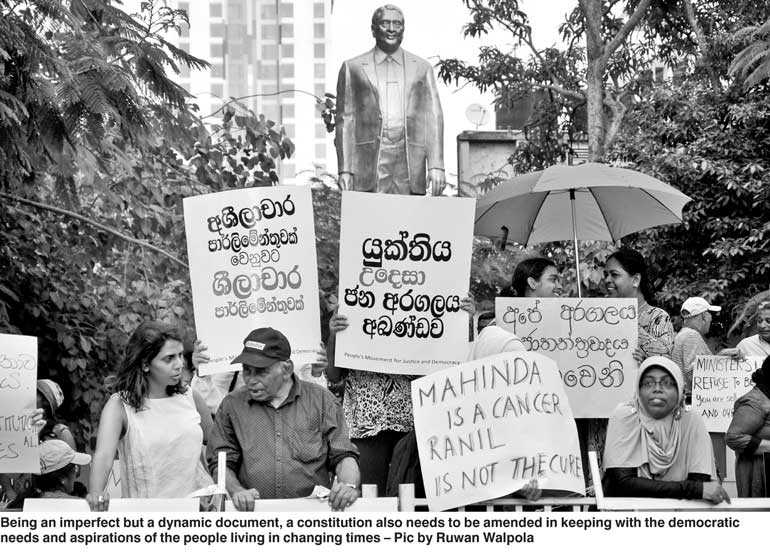Friday Feb 20, 2026
Friday Feb 20, 2026
Saturday, 10 November 2018 00:01 - - {{hitsCtrl.values.hits}}

By Bernard Fernando
At the outset, we as citizens are aware that a Constitution is a well-intentioned instrument to ensure and sustain good governance, integrity, sanity, law and order in a country. We know that despite the meticulous attention given for its drafting by constitutional experts, it is prone to loopholes and interpretational difficulties caused by exceptional, unforeseen circumstances and human error.
We are also aware of a global phenomenon where crooked legal experts deliberately introduce ambiguous clauses in to legislation with ulterior business motives. Therefore, we have to admit that it will never be a perfect document and will be open to multiple interpretations by persons with vested interests, different motives, affiliations and integrity levels as it is happening now in our motherland.
People’s expectations
Being an imperfect but a dynamic document, a constitution also needs to be amended in keeping with the democratic needs and aspirations of the people living in changing times. People expect that all efforts are made to minimise ambiguity and maximise clarity of clauses/Articles to achieve the sacred objectives of a constitution without making it replete with legal jargon.
Thus, in the event of any ambiguity, or interpretational problem, the concerned parties should not look for loopholes and engage in hair splitting arguments, but strive to implement the good spirit of the different clauses in order to deliver justice to the sovereignty of the simple voters who elect a Govt. for a specific period under a specific symbol.
Who should draft or propose amendments to the Constitution?
In our view, if the constitution is the primary document to safe guard the sovereignty of the people, it should be drafted by the people themselves as the principals and not given to the politicians who are only agents required by the principals to act in terms of the constitution. If politicians take over, the drafting of a constitution, it is tantamount to a conflict of interest as happening now with the existing Constitutional Assembly which is not the people’s wish. Thus, its failure to deliver the goods for the last 3½ years is a blessing in disguise.
Remedial action
In the circumstances, I venture to suggest a few remedies for the lessons learnt from the present constitutional imbroglio.
1) The principals constituting the civil society assisted by a genuine legal fraternity including retired Judges, should be immediately assigned with the task of re-framing and/or amending all the debatable clauses in the constitution in order to ensure utmost clarity, justice, peace, equity and democracy. To achieve such end, the process should be transparent seeking political as well as public opinion and advice through the mass media before finalizing the draft amendments. Some clauses which need immediate attention are:
a) The abolition of the ‘cross-over mockery’ in order to prevent ‘horse -trading’ by the agents of the people for filthy lucre and power and ensure sanity of the Parliament though it may not arise if step No. 3 below is successfully implemented. In this regard clause No. 99(13) needs to be amended.
b) The removal of the clause which allows the executive president to appoint ministers at his will from another party to ensure political peace, good order and Parliament democracy.
c) Instead, entry in to the cabinet should be made a constitutional right of all seat winning parties on a proportionate basis which will see the emergence of a truly ‘national/peoples’ govt.’ for all times. This amendment will surely help to remove all political and ethnic rivalries and make politicians think and act as true ‘Sri Lankans‘ to achieve the common goal of developing the country.
d) The clauses which enable the Executive President to usurp the sovereignty and independence of the Parliament should be removed to prevent any future conflict arising between the two institutions. In other words, the need for intervention by the Judiciary on constitutional matters should be minimised as prevention is better than cure. Also, in the light of the divided public opinion on the continuation of the ‘executive presidential system’, it is reasonable to strike equilibrium by further reducing the unhealthy powers of the executive presidency.
2) A robust public opinion poll should be held to convert the finalised amendments to a sovereign document directly coming from the principals, viz. the people. Thereafter, the political agents and vested interests should not be allowed to tinker with such well-founded clauses at parliament level and/or official level. Only the rubber stamp of the Cabinet and the Parliament would be needed to legalise the amendments.
3) The Election Commission should lay down stringent eligibility criteria coupled with a structured interview system for parties to select genuine, patriotic, political professionals with high integrity to enter the Parliament...(I have dealt with this subject in much detail through my several articles to the press over the years).
We earnestly appeal to the Government and all civil society activists and organisations to assist in this national endeavour of making Sri Lanka a proud, decent and a civilised nation.